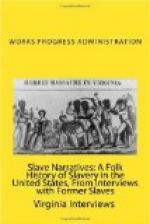“I was born in Harrison County, 19 miles from Pass Christian, ’long de ridge road from de swamp near Wolf River. My Marster was Ursan Ladnier. De Mistis’ name was Popone. Us was all French. My father was a white man, Anatole Necaise. I knowed he was my father, ’cause he used to call me to him an’ tell me I was his oldes’ son.
“I never knowed my mother. I was a slave an’ my mother was sol’ from me an’ her other chilluns. Dey tol’ me when dey sol’ ’er my sister was a-holdin’ me in her arms. She was standin’ behin’ da Big House peekin’ ‘roun’ de corner an’ seen de las’ of her mother. I seen her go, too. Dey tell me I used to go to de gate a-huntin’ for my mammy. I used to sleep wid my sister after dat.
“Jus’ lemme study a little, an’ I’ll tell you ’bout de Big House. It was ‘bout 60 feet long, built o’ hewed logs, in two parts. De floors was made o’ clay dey didn’ have lumber for floors den. Us lived right close to de Big House in a cabin. To tell de truf, de fac’ o’ de business is, my Marster took care o’ me better’n I can take care o’ myse’f now.
“When us was slaves Marster tell us what to do. He say, ’Henri, do dis, do dat.’ An’ us done it. Den us didn’ have to think whar de nex’ meal comin’ from, or de nex’ pair o’ shoes or pants. De grub an’ clo’es give us was better’n I ever gits now.
“Lemme think an’ counts. My Marster didn’ have a lot o’ slaves. Dere was one, two, three, fo’, yes’m, jus’ fo’ o’ us slaves. I was de stockholder. I tended de sheep an’ cows an’ such lak. My Marster didn’ raise no big crops, jus’ corn an’ garden stuff. He had a heap o’ cattle. Dey could run out in de big woods den, an’ so could de sheeps. He sol’ cattle to N’awlins[FN: New Orleans] an’ Mobile, where he could git de bes’ price. Dat’s de way folks does now, aint it? Dey sells wherever dey can git de mos’ money.
“Dey didn’ give me money, but, you see, I was a slave. Dey sho’ give me ever’thing else I need, clo’es an’ shoes. I always had a-plenty t’eat, better’n I can git now. I was better off when I was a slave dan I is now, ’cause I had ever’thing furnished me den. Now I got to do it all myse’f.
“My Marster was a Catholic. One thing I can thank dem godly white folks for, dey raise’ me right. Dey taught me out o’ God’s word, ’Our Father which art in Heaven.’ Ever’body ought-a know dat prayer.”
(Note. In this Wolf River territory in Harrison County, where Uncle Henri was born and raised, all the settlers were French Catholics, and it was the scene of early Catholic missions.)
“I was rais’ a Catholic, but when I come here twant no church an’ I joined de Baptis’ an’ was baptised. Now de white folks lemme go to dey church. Dey aint no cullud church near ‘nough so’s I can go. I spec’ its all right. I figgers dat God is ever’where.
“My Mistis knowed how to read an’ write. I don’ know ’bout de Marster. He could keep sto’ anyway. Us all spoke French in dem days. I near ’bout forgit all de songs us used to sing. Dey was all in French anyway, an’ when you don’ speak no French for ‘bout 60 years, you jus’ forgit it.




